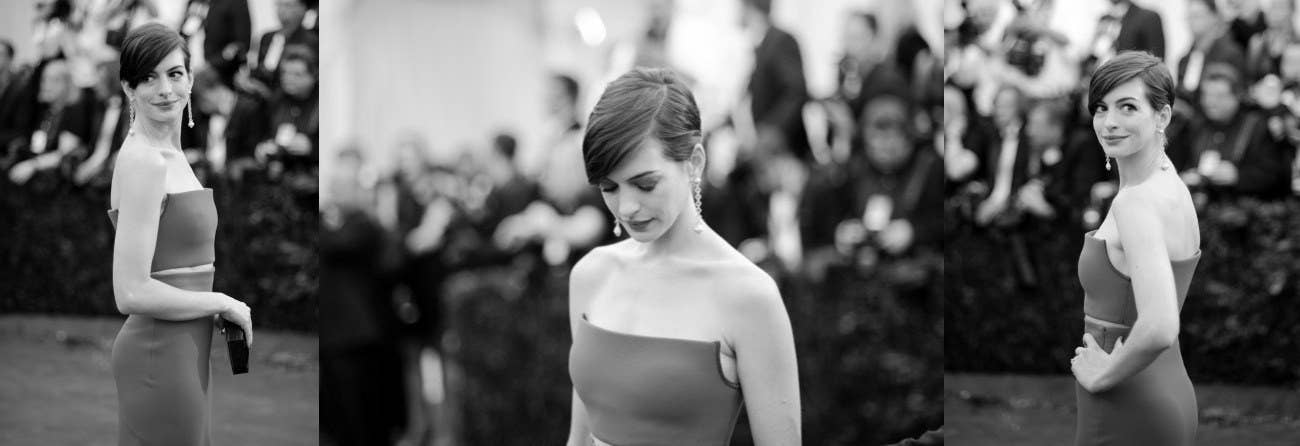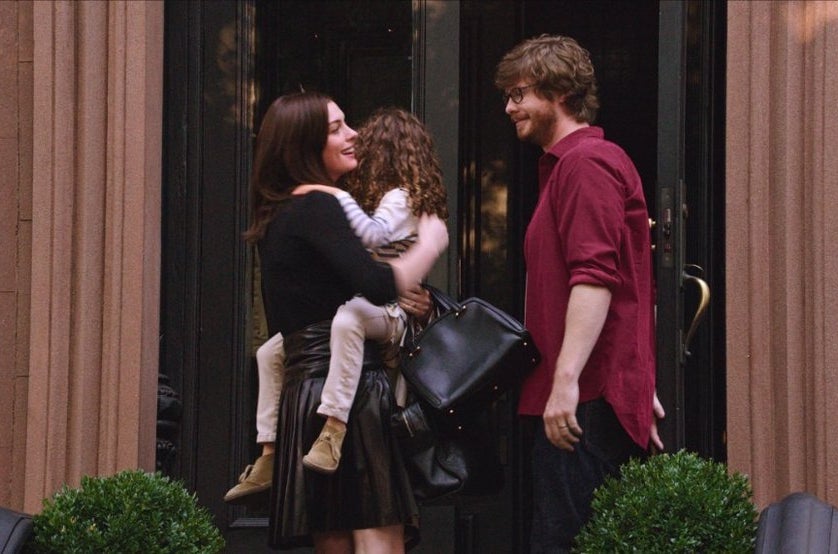
When you work hard, when that work is awarded, when your body and beauty match societal standards, when you check every box, and still everyone tells you you’re doing it wrong, that’s Anne Hathaway Syndrome.
The first symptoms of Anne Hathaway Syndrome appeared in the run-up to the 2013 Oscars, when the composed, on-point Hathaway (nominated for Best Supporting Actress for her performance in Les Miserables) became a natural foil to Jennifer Lawrence’s cool girl tsunami. If Lawrence was the girl both men and women wanted to drink beers with, then Hathaway was the one dominating the conversation at the cocktail party. Or so it seemed, and so the internet reinforced: “Why Do Women Hate Anne Hathaway? (But Love Jennifer Lawrence?),” posed New York Magazine; “Anne Hathaway vs. Jennifer Lawrence: Why we hate one and love the other,” The Globe and Mail explained; “The Happy Girl vs. The Cool Girl: Why People Don’t Like Anne Hathaway,” wrote Indiewire. The New York Daily News even interviewed people on the street about their hatred of Hathaway: “She’s trying too hard to please everyone,” said one 28-year-old from Queens. “We’re over it.”
Hathaway’s immediate tactic was to admit that her feelings had been hurt — “It does get to me,” she confessed. “But you have to remember in life that there’s a positive to every negative and a negative to every positive. The miracle of the universe is that, as far as they know, there’s a 51 % matter versus 49 % antimatter — things tip in the scale of the positive. So that’s what I focus on.”
It was a perfect Hermione Granger answer. It was also just as deeply annoying as the moment she stepped on the stage, Oscar in hand, and started her speech with, “It came true.”

In theory, this is a graceful, even adorable way to accept an award: I dreamt of this sort of success, it implies, and I worked hard enough that you made it all come true. But Hathaway isn’t allowed to be happy for herself, or be confident in her successes, or admit that her feelings are hurt when people ridicule her endlessly for having a demeanor that suggests either of those things. Her actions aren’t unruly enough to set a progressive/aggressive example around which women can rally. In fact, she’s so in line with the vision of the perfect female actress — feminine, versatile, charming, with a Pilates body and a mile-long Julia Roberts smile — that it can sometimes seem like she was made in a laboratory.
Which is part of the problem, of course: You can’t calculate charisma or cool. Both are contingent on the absence of trying, and Anne Hathaway is nothing if not a woman-shaped aggregation of trying. All female celebrities, like all people, are of course trying at something; it’s just that some, like Lawrence, do a (much) better job of hiding the effort. And stardom, like so much of the contemporary manufacture of the self vis-à-vis the internet, is rooted in final products that betray no signs of labor.
So Hathaway stopped trying, at least for a bit. She’s had only one starring role — as a scientist in Interstellar — since her Oscar win, and she's maintained a relatively low profile. But in the last six months, The Try has returned: Alongside Kristen Stewart and Brie Larson, she’s the least cool part of Jenny Lewis’s “Just One of the Guys” music video. Her rendition of Miley Cyrus’s “Wrecking Ball” on Lip Sync Battle was dialed to 11. Her Instagram is a series of self-conscious selfies, sincere mourning for Cecil the lion, dad jokes, and publicity shots paired with invitations to join her at the Apple Store, and cringeworthy use of hashtags.
But Hathaway's really not doing anything that different from Taylor Swift or Anna Kendrick, both of whom occupy a similar level of Tracy Flick–ness. But their Try is just slightly less visible and, as such, infinitely more tolerable. Hathaway has checked every box on the “how to be a female celebrity” checklist. What’s frustrating, and maybe even tragic, is that doing so still makes people deeply dislike her.
Which is a lesson that can be applied to most women: Success is not the same as likability. In fact, it’s often something that leads to the opposite. The things we value in men (power, drive, decisiveness) become the things we stigmatize in women. That’s nothing new, and women have been railing against it for decades — including women, like myself, who still dislike Anne Hathaway. I can see that it’s unfair, and yet the annoyance still wells up — the urge is to tell her to chill as I read her telling Refinery 29 just how chill she’s been all summer.
The Intern, then, is really a two-hour meditation on Anne Hathaway Syndrome. As Jules, the CEO of a fashion tech startup (think Gilt), Hathaway embodies the current (mostly white, certainly bourgeois) feminist moment. She’s trying to triumph over the systemic sexism of venture capital and legitimize a form of commerce that’s been feminized. She’s also trying to have a giving marriage, be a good mom, not emasculate her stay-at-home husband, impress her questioning investors, and still have time to sleep, or eat. Her company is successful, in large part due to her incredible attention to detail and her willingness to tackle the smallest problem herself. She is without guile; she is focused but kind; she is the opposite of the castrating bitch. She has a great body and a perfect sense of style, and none of the stress of holding everything together is visible. She cries only very little, and only in private. She’s theoretically the ideal modern woman: a sleek have-it-all bot.


For her efforts, Jules is passive-aggressively shamed by her fellow Brooklyn moms. Her own mother is not forthcoming with affection or affirmation. She has no female friends. And, PREDICTABLE SPOILER ALERT, her husband cheats on her. But unlike other rom-coms that posit a woman’s career as the source of her unhappiness, The Intern suggests something revelatory: Jules is still happy. She doesn’t want to quit her job to make her husband love her again. In fact, she doesn’t even want to take less responsibility, but more. She loves her job and the thing she created, and finds pleasure, energy, and delight in it — why would she stop?
The person who helps her come to this realization is the one who can see her situation the most clearly: her “senior intern” Ben, played by Robert De Niro. He’s 40 years her senior, a total analog in a digital world, but he’s also truly satisfied with the life he’s lived and recognizes Jules’ business acumen, her remarkable competence, and her fundamental excellence. This is all somewhat implausible, but then again, he does live in Park Slope.
Ben’s the one who lectures the harpy Brooklyn playground moms when they say Jules is “difficult”; he’s also the one who tells Jules things like, “If I’ve ever met someone who doesn’t need a boss, it’s you,” and, “You should feel nothing but great about what you’ve done.” We learn that Ben’s attitude might come from observing his late wife, who was a middle school principal, a mother, and a woman who “handled life like it was easy, even when it wasn’t.” De Niro’s character is charming, but he also reveals himself as the biggest feminist of the film, maybe even in any Nancy Meyers movie. But that doesn’t change the fact that Jules was so wholly unsupported that a 70-year-old man — not feminist allies within the workplace, or supportive working moms in the neighborhood, or her own mother — is the person to underline the truths she already knew about herself: That she was doing all right, and everyone else might be a little, or a lot, wrong.
But we’re taught to think of ourselves as the accumulation of what others think of us, and celebrity images — and thus their livelihoods — are a product of the same calculus. Within the confines of The Intern, it’s easy to see how unfairly Jules is treated. It’s harder, however, to see our own repulsion from Hathaway within that same paradigm: how we react against a woman who’s done her job too well, who’s failed to adequately hide her effort, and thereby opened herself to our generalized, often difficult to articulate, yet all the more powerful dislike.
Of course, everyone has the right to feel any way they please about the popular images that surround us. But, as always, those feelings say more about us — what we value and decry, but also our inner complexities and hypocrisies — than they do about the celebrities themselves.
I still find myself resisting Anne Hathaway. But I’m also spending a lot of time thinking about why I feel that way.
